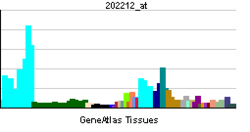- PES1
-
Pescadillo homolog is a protein that in humans is encoded by the PES1 gene.[1][2][3][4]
This gene encodes a protein that is abnormally elevated in malignant tumors of astrocytic origin. It is a strongly conserved gene containing a BRCT domain that is essential for the activity of this gene product. The gene plays a crucial role in cell proliferation and may be necessary for oncogenic transformation and tumor progression.[4]
References
- ^ Allende ML, Amsterdam A, Becker T, Kawakami K, Gaiano N, Hopkins N (Jan 1997). "Insertional mutagenesis in zebrafish identifies two novel genes, pescadillo and dead eye, essential for embryonic development". Genes Dev 10 (24): 3141–55. doi:10.1101/gad.10.24.3141. PMID 8985183.
- ^ Dunham I, Shimizu N, Roe BA, Chissoe S, Hunt AR, Collins JE, Bruskiewich R, Beare DM, Clamp M, Smink LJ, Ainscough R, Almeida JP, Babbage A, Bagguley C, Bailey J, Barlow K, Bates KN, Beasley O, Bird CP, Blakey S, Bridgeman AM, Buck D, Burgess J, Burrill WD, O'Brien KP, et al. (Dec 1999). "The DNA sequence of human chromosome 22". Nature 402 (6761): 489–95. doi:10.1038/990031. PMID 10591208.
- ^ Rohrmoser M, Holzel M, Grimm T, Malamoussi A, Harasim T, Orban M, Pfisterer I, Gruber-Eber A, Kremmer E, Eick D (May 2007). "Interdependence of Pes1, Bop1, and WDR12 Controls Nucleolar Localization and Assembly of the PeBoW Complex Required for Maturation of the 60S Ribosomal Subunit". Mol Cell Biol 27 (10): 3682–94. doi:10.1128/MCB.00172-07. PMC 1899993. PMID 17353269. http://www.pubmedcentral.nih.gov/articlerender.fcgi?tool=pmcentrez&artid=1899993.
- ^ a b "Entrez Gene: PES1 pescadillo homolog 1, containing BRCT domain (zebrafish)". http://www.ncbi.nlm.nih.gov/sites/entrez?Db=gene&Cmd=ShowDetailView&TermToSearch=23481.
Further reading
- "Toward a complete human genome sequence". Genome Res. 8 (11): 1097–108. 1999. doi:10.1101/gr.8.11.1097. PMID 9847074.
- Kinoshita Y, Jarell AD, Flaman JM, et al. (2001). "Pescadillo, a novel cell cycle regulatory protein abnormally expressed in malignant cells". J. Biol. Chem. 276 (9): 6656–65. doi:10.1074/jbc.M008536200. PMID 11071894.
- Andersen JS, Lyon CE, Fox AH, et al. (2002). "Directed proteomic analysis of the human nucleolus". Curr. Biol. 12 (1): 1–11. doi:10.1016/S0960-9822(01)00650-9. PMID 11790298.
- Oeffinger M, Leung A, Lamond A, et al. (2002). "Yeast Pescadillo is required for multiple activities during 60S ribosomal subunit synthesis". RNA 8 (5): 626–36. doi:10.1017/S1355838202020022. PMC 1370283. PMID 12022229. http://www.pubmedcentral.nih.gov/articlerender.fcgi?tool=pmcentrez&artid=1370283.
- Scherl A, Couté Y, Déon C, et al. (2003). "Functional Proteomic Analysis of Human Nucleolus". Mol. Biol. Cell 13 (11): 4100–9. doi:10.1091/mbc.E02-05-0271. PMC 133617. PMID 12429849. http://www.pubmedcentral.nih.gov/articlerender.fcgi?tool=pmcentrez&artid=133617.
- Strausberg RL, Feingold EA, Grouse LH, et al. (2003). "Generation and initial analysis of more than 15,000 full-length human and mouse cDNA sequences". Proc. Natl. Acad. Sci. U.S.A. 99 (26): 16899–903. doi:10.1073/pnas.242603899. PMC 139241. PMID 12477932. http://www.pubmedcentral.nih.gov/articlerender.fcgi?tool=pmcentrez&artid=139241.
- Ota T, Suzuki Y, Nishikawa T, et al. (2004). "Complete sequencing and characterization of 21,243 full-length human cDNAs". Nat. Genet. 36 (1): 40–5. doi:10.1038/ng1285. PMID 14702039.
- Lapik YR, Fernandes CJ, Lau LF, Pestov DG (2004). "Physical and functional interaction between Pes1 and Bop1 in mammalian ribosome biogenesis". Mol. Cell 15 (1): 17–29. doi:10.1016/j.molcel.2004.05.020. PMID 15225545.
- Maiorana A, Tu X, Cheng G, Baserga R (2004). "Role of pescadillo in the transformation and immortalization of mammalian cells". Oncogene 23 (42): 7116–24. doi:10.1038/sj.onc.1207916. PMID 15273728.
- Collins JE, Wright CL, Edwards CA, et al. (2005). "A genome annotation-driven approach to cloning the human ORFeome". Genome Biol. 5 (10): R84. doi:10.1186/gb-2004-5-10-r84. PMC 545604. PMID 15461802. http://www.pubmedcentral.nih.gov/articlerender.fcgi?tool=pmcentrez&artid=545604.
- Killian A, Le Meur N, Sesboüé R, et al. (2004). "Inactivation of the RRB1-Pescadillo pathway involved in ribosome biogenesis induces chromosomal instability". Oncogene 23 (53): 8597–602. doi:10.1038/sj.onc.1207845. PMID 15467761.
- Gerhard DS, Wagner L, Feingold EA, et al. (2004). "The Status, Quality, and Expansion of the NIH Full-Length cDNA Project: The Mammalian Gene Collection (MGC)". Genome Res. 14 (10B): 2121–7. doi:10.1101/gr.2596504. PMC 528928. PMID 15489334. http://www.pubmedcentral.nih.gov/articlerender.fcgi?tool=pmcentrez&artid=528928.
- Andersen JS, Lam YW, Leung AK, et al. (2005). "Nucleolar proteome dynamics". Nature 433 (7021): 77–83. doi:10.1038/nature03207. PMID 15635413.
- Hölzel M, Rohrmoser M, Schlee M, et al. (2005). "Mammalian WDR12 is a novel member of the Pes1–Bop1 complex and is required for ribosome biogenesis and cell proliferation". J. Cell Biol. 170 (3): 367–78. doi:10.1083/jcb.200501141. PMC 2171466. PMID 16043514. http://www.pubmedcentral.nih.gov/articlerender.fcgi?tool=pmcentrez&artid=2171466.
- Kimura K, Wakamatsu A, Suzuki Y, et al. (2006). "Diversification of transcriptional modulation: Large-scale identification and characterization of putative alternative promoters of human genes". Genome Res. 16 (1): 55–65. doi:10.1101/gr.4039406. PMC 1356129. PMID 16344560. http://www.pubmedcentral.nih.gov/articlerender.fcgi?tool=pmcentrez&artid=1356129.
- Ewing RM, Chu P, Elisma F, et al. (2007). "Large-scale mapping of human protein–protein interactions by mass spectrometry". Mol. Syst. Biol. 3 (1): 89. doi:10.1038/msb4100134. PMC 1847948. PMID 17353931. http://www.pubmedcentral.nih.gov/articlerender.fcgi?tool=pmcentrez&artid=1847948.
Categories:- Human proteins
- Chromosome 22 gene stubs
Wikimedia Foundation. 2010.

